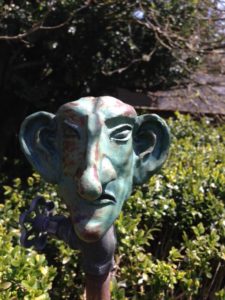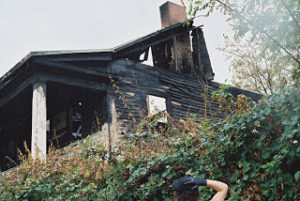![]()
dip, dart, twist, soar, slide
above wind tossed branches
ecstatic crow flies
![]()
dip, dart, twist, soar, slide
above wind tossed branches
ecstatic crow flies
 e noticed her first. Tall and beautiful, she gazed about the garden until, at last, she saw him. She looked away quickly, confused. Was it usual to be stared at so rudely? She fled into the shadows.
e noticed her first. Tall and beautiful, she gazed about the garden until, at last, she saw him. She looked away quickly, confused. Was it usual to be stared at so rudely? She fled into the shadows.
But she returned. She grew used to seeing him, watching her. He did nothing to alarm her. One day, to both their surprise, she smiled.
They talked all summer, about their hopes, fears, eventually about their future together. But in their swift slide into love, they forgot one thing.
*****
“Honey, it’s time to bring the garden decorations in. It’s going to freeze tonight.”


a drabble by Becky Kjelstrom
The Grundvig chin. The whole family gets it. Dominant gene. My baby won’t. CRSPR is new officially not for sale. My baby will have a perfect chin. Money buys on demand birth and good drugs. But I still have to push. C-Section leaves a scar, visible if you go Brazilian.
Despite the numbness, I feel her coming. She’s howling mad. Mate cuts the cord, nurse wipes her off and hands her to me. I look at baby, mate, baby. My turn to howl, raw anguish.
The Wilson receding chin. Recessive gene. We didn’t correct for that.
Heat and dust. The little girl kicked a stone down the road. No fair! Sent to the store twice in one day, a quarter clutched in her small, sweaty hand.
At the corner the old woman with the sun hat still worked in her yard. This morning she’d been clipping roses, now she was cutting rhubarb with a sharp knife. Whack! at the ground. Whack! again at the top. A pile of shiny red stalks at her feet, huge wilting leaves heaped on the grass.
Little Girl put her head down and walked faster. Too late. “Barbara Jayne! Would you like to take some rhubarb to your mother?” “No! I hafta go to the store!” She broke into a run. “Your mother makes such lovely pies.”
Little Girl ran faster down the long hill. She stopped at the crossing, hopped into the street as a car horn blared, raced to the curb and up the steps to the store. Inside it was stuffy but cooler. The fat storeman smoked at the back counter, looked up from his newspaper. “Back again, huh?” Little Girl laid the quarter on the counter. “Loaf of bread, quart of milk.” The storeman’s eyebrow shot up. “Please!”
He fetched the milk from the icebox, the bread from the bin, took the quarter. “You got change comin’ or do you want some candy?” “No!” Little Girl grabbed the groceries. “Ma says put it on her account.” She slammed out the door, into the blinding afternoon.
The hill was steeper now that she was walking up it. She was thirsty, should have bought a soda. But Sister would have seen the bottle and told on her. Pooh. She stopped, tried to put the loaf of bread on her head for shade. It wouldn’t stay, dropped in the dusty road. A car was coming! She picked up the loaf, wiped the package clean on her dress and turned her back on the swirl of dust stirred up by the passing auto.
By the time she reached the top of the hill, Little Girl thought a drink of milk might be a good idea. Nope. She’d be in trouble with Sister for opening the bottle.
At the corner, Old Woman had disappeared from her yard, the rhubarb stalks were gone, too. But the big green leaves still lay on the grass. Little Girl looked up and down the road. She looked at Old Woman’s house. No one. Setting the milk and bread at the side of the road, she picked up a rhubarb leaf, plonked it on her head. Cool relief!
Little Girl walked toward home, remembering, in the nick of time, to turn back and fetch the bread and milk from the roadside.
“Hurry up, slow poke! That milk will be curdled by the time you get in here.” Sister stood on the porch. “What do you have on your head?” Ma stood at the kitchen window, laughing.
“Sun hat!” Little Girl tipped her head back, stuck out her tongue.
Sister bounded off the porch, jerked the milk and bread out of Little Girl’s hands. “Come on! Ma’s gonna make a rhubarb pie for dinner. You gotta go to the store for butter.”
She looks at the photograph.
Three-by-two, black and white snapshot
Of a young boy she never knew.
Next to it, on her vanity,
A school portrait of a teenage girl
Spotty with age, also unknown.
But one day, long ago, the boy
And girl met in a high school hallway,
Dust motes rising in the sunlight
Of a spring afternoon.
Together, years later, they created her.
And then two others.
Now they are dust, leaving only images
Of themselves, from the time before
Us.
They like viewing art together. They go to the museum or a new gallery and view the art. They talk about it, there, at the museum or gallery and later, in a coffee shop or restaurant or while walking down the street or even late at night, at home. They discuss and dissect the art they’ve viewed together, what they liked or didn’t like, how it made them feel. Looking at art is one of the things they enjoy doing together, in public.
There are other things they enjoy doing together, but those things cannot be done in public.
Image by Steven Tannenbaum
Have you ever watched a TV drama where a coma patient opens his eyes and becomes instantly awake, alert, and “normal?” The daytime soaps do it best. All the family is gathered about the bedside, five years after the accident, and voila, the actor who couldn’t make in prime time has his old job back.
Not that there isn’t drama in the slow, painstaking, stage-by- stage return to consciousness. But it doesn’t play well on an hour drama, continuing soap, or a half hour. So, after my son’s tangle with an automobile sixteen years ago, I can finally find the humor. Sure, I could laugh at the time, but it was more an alternative to bawling my eyes out or just plain shattering into a thousand pieces.
Later it was a nervous, testing fate laugh. Now that I trust he’ll pull through, I can laugh, grateful laughter coming from the gut. I can laugh at parts of what happened on that date from which all things will forever be reckoned.
Back to the opening of the eyes. Having seen those shows I berated earlier, my husband and I hovered around our son’s intensive care bed, (as much as one can hover with all the blinking, blipping machinery around) awaiting the unveiling of those windows to the soul. Even the real nurses told us an early opening was important to recovery. So, we waited, we hovered, we feared, and we hoped.
Doctors, nurses, orderlies, custodians, and all manner of hospital denizens came and went. Friends and co-workers brought food and pity. We ate the food and avoided the pity. We had enough of our own, thank you very much. We would have sold our eyeteeth, our family jewels, our futures, and our eternal salvation to move this kid along the stages of coma to consciousness. The price, luckily, ended up being far less.
We explained coma to a practical, down-to- earth friend, a woman with children grown. She asked, “What does he like most?”
“Basic principle of reward. Offer what he wants to get what you want.” She was practical.
“Oh.” We said in unison, a speck of light glimmering in our cortisolled brains.
My mouth worked first. “He likes Nintendo, soccer, hot dogs, candy…”
We looked at each other. “Money!”
Yes, our little ten year old was a mercenary creature. Always looking for a dime.
“Money.” Our friend smiled. “So, what’s a lot of money for a kid these days?
Mine were happy with a penny, but that was long ago. A dollar too little? Twenty too
“Five.” That was my husband this time. I nodded in accord.
My husband pulled the sacrificial tender from his wallet as we reverently circled the hospital bed. My agnostic heart couldn’t quite pray over it. But I could see in his eyes, my husband’s Christian heart did.
He waved the holy wafer over my son. “Here’s five bucks. It’s yours. Just open your eyes.”
“I’m adding five.” The friend brandished hers as a crusader’s sword.
And the room slumbered, save for the flame-like crinkle of the bill and the thrumming chant of the machines.
Again we waited, hovered, etc. Those two five dollar bills had to be right. They had to be enough.
When our friend withdrew we smiled our see you laters. She slipped her five into my pocket. We didn’t say anything more. My husband stayed as long as he could, but another son had a life one of us must tend to.
“Have you asked him yet to open his eyes?” My husband stood next to me.
Sunlight peered through the blinds. I had no idea when either had entered the room.
“No.” I didn’t tell him I lacked the courage. I slid the money from my pocket and
“Open your eyes. You need to open your eyes. You want the money, don’t you?”
Morning goop outlined the lids, but they flickered. My autonomic nervous system forgot about breath and heartbeat.
The lids cracked. The goop parted.
That’s what it took. He had the best care, the best doctors, the best machines, the best medicines. But two five dollar bills opened his eyes. The long process of recovery began.
Unlike those TV dramas it wasn’t an angel, a puppy, a threat, or family pressure. It wasn’t even true love. It was money. Two fives.
Image by Becky Kjelstrom
How can I refuse?
He doesn’t ask for much.
It isn’t like he’s wanting a million bucks. I don’t have that anyway. Never had, never will. And Barry’s my real friend- I don’t have many of those. Fair weather ones, yeah, I got plenty. Foul? I can count on one hand. And the weather around here is mostly foul. That’s a Pacific Northwest joke, get it?
I can’t say no, after all he does have a hot date for Thanksgiving dinner.
There they are at the front of the line. He’s playing gentleman, giving her his coat to protect her from the rain. And she’s drowning in it, just a little slip of a thing. Former tweaker Barry says. That meth will whittle you down to skin and bones. Skin stretched tight as an overdone turkey. I’ll bet she’s not been clean long or she’d have put on a few pounds. Mission food will do that if you’re not burning it off with crank.
I’m back more than halfway, holding up the dirty concrete wall. I’ll still get in before the food runs out. They sometimes even have enough for seconds if you want to wait around until everyone’s fed. Last year a waiter from a high class restaurant volunteered and wrapped the left-overs up in foil birds.
At least here I don’t have to pay for my grub by having some self-righteous snob try to stuff Jesus, Mary and Joseph down my throat with the cranberries. Like I wouldn’t just barf them up. Man like me has no room for the nicey-nice of religion in my life, even though Mom always hoped I’d be a preacher.
‘Rafael,’ she’d say, ‘you’ve got the spirit of God in you.’ God, no. Spirit, yes. I always did like spirit as long as it came out of a bottle of Jim Beam.
Even from here old Barry looks good. He’s smiling away like the cat that ate the canary. Or maybe the cat in that old cartoon where the girl goes down the rabbit hole. A little Disney on acid. That cat’s smile still haunts some of my dreams, part of my flashbacks the Vet counselor says. But on old Barry it looks good.
Me? I’ll have to pass on the turkey, stick to the potatoes, gravy, and the jellied cranberry sauce. Maybe some dressing if it’s nice and soggy.
Here it is two weeks later and I’m still gumming mostly potatoes, gravy, and Wonder bread. Barry and his little ex-tweaker split town. Maybe she wasn’t so ex. Or maybe that old warrant Barry used to brag had magically disappeared, finally reappeared, just like that Cheshire Cat and his grin. And the cops caught him by the tail.
Now I’m left wondering how I’m going to sweet talk the Vet dentist into springing for a new set of teeth.
Image by Becky Kjelstrom
 n the night, Old Man heard Boy get up and leave his bedroom. “He’ll be going to the toilet,” Old Man thought. But Boy walked past the bathroom. Old Man heard the top stair moan, the fourth step creak. He struggled out of bed. Old Man grabbed his robe, searched with one foot for his slippers. The back door slammed. He gave up.
n the night, Old Man heard Boy get up and leave his bedroom. “He’ll be going to the toilet,” Old Man thought. But Boy walked past the bathroom. Old Man heard the top stair moan, the fourth step creak. He struggled out of bed. Old Man grabbed his robe, searched with one foot for his slippers. The back door slammed. He gave up.
Old Man got downstairs and outside in time to see Boy’s white-blond head disappear into the summer night. “Not again!”
Old Man stepped onto the dew slicked lawn and headed down the yard. Through the hedge and alongside the vegetable garden, he made out Boy’s shadow in the small orchard. “I’m too old for this nonsense.” Something rustled in the bush and Old Man walked faster.
Boy moved slowly, his head swaying from side to side. He entered the little wood that divided the two properties.
“Damnit.” With his longer legs, Old Man was catching up, but not quickly enough.
Old Man emerged from the wood, the smell of wet ash and burnt wood hit him in the face. Boy stood at the back door or the darkened hulk, his hand on the door knob.
“No.” Old Man whispered. Boy turned slowly.Old Man could see Boy’s eyes, open wide but sleeping, sightless.
He went to him, laid his hand on Boy’s thin shoulder and guided him gently away.

A bird trilled. Old Man looked up to the silvering sky. “Almost dawn.”
They walked. Through the wood and orchard, up the garden, into the lightening dawn, back to the big white house.
Old Man sat Boy down on the edge of the bed, wiped his feet with a corner of his robe and eased Boy back onto his pillow. His eyes were closed now but tears gleamed on his cheeks. “Grandpa?” Boy murmured.
“You sleep son.”
In the morning, smells of coffee and toast awakened Boy. He stretched and sat up, unfurling his cramped fingers. A circle of soot marked his palm, the faint odor of burnt metal obliterated the aroma of breakfast.
“Not again!” Crying, Boy went to wash his hands.
Image by Amanda Ball